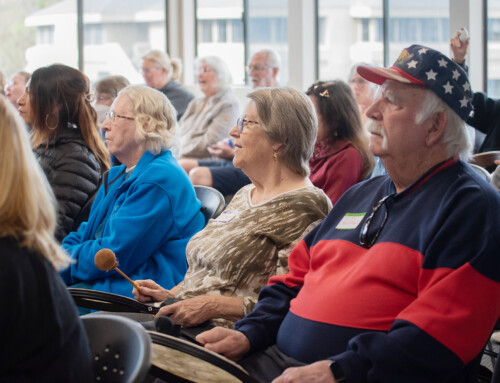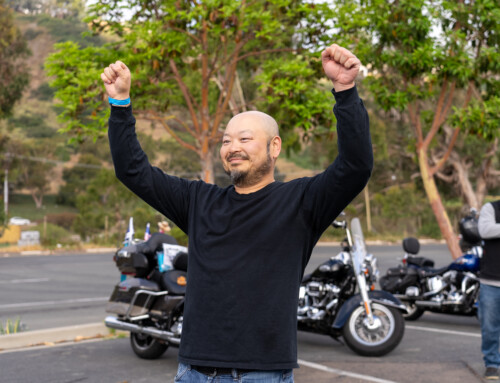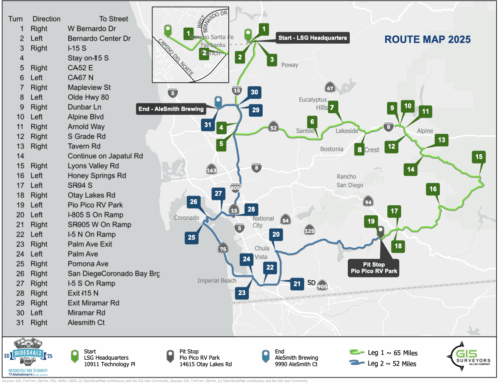By Ronda Savel
 Caring for someone with Alzheimer’s or another dementia, while rewarding, can also be challenging. When a loved one with dementia lives far away, there are even more complexities to consider.
Caring for someone with Alzheimer’s or another dementia, while rewarding, can also be challenging. When a loved one with dementia lives far away, there are even more complexities to consider.
Alzheimer’s San Diego recently held a class called Long-Distance Caregiving, designed to provide practical tips of how to be a helpful care partner from afar. Class attendees said they were caring for someone with dementia in different cities, states, countries and even continents.
“A caregiver once described his daily experience to me as ‘living two lives at the same time’ as he struggled to manage every aspect of his wife’s life – while also living his own,” said Amy Abrams, MSW/MPH, education director for Alzheimer’s San Diego, who facilitated the class. “That resonates with a lot of long-distance caregivers, who have the additional challenge of the miles between them.”
RELATED | Upcoming education classes & events
Some of the unique challenges of being a long-distance caregiver include access to incomplete or unreliable information, uncertainty of when to intervene, guilt and potential family conflict, and logistics including time differences and travel time and expenses.
However, Amy stressed that it is possible to meet your loved one’s needs despite the number of miles that separate you physically. She encouraged the class to think about how they could support the primary, local caregivers.
“Ask how you can specifically be the most helpful to them, and consider how your own schedule might be adapted to give the local caregiver a break,” Amy explained. “Let them know that you are here to support them as best you can.”
She also challenged the class to identify local support for the person living with dementia. That could include the local Area Agency on Aging, community organizations like Alzheimer’s San Diego, senior centers, libraries, family friends and neighbors. All it takes is a Google search to find these valuable resources!
Another option could be working with Aging Life Care Professionals, also known as care managers. These trained professionals can help you navigate the long-term care system and be your eyes and ears when you’re not there.
Need support? Talk to one of our dementia experts
Amy also shared that there are a number of technology solutions available to help you stay in touch with your loved one. These solutions can even provide technological support for the caregiving in the event of a personal emergency. Some examples are automated check-in calls and reminder systems, online caregiving journals for coordinating care teams, personal emergency response systems, wearable activity trackers, fall detectors, and GPS devices.
Technology solutions can be extremely helpful especially if there’s a live-in caregiver. However, if your loved one lives alone and manipulates the system in any way, the information you gain from technology solutions will be unreliable.
It’s important to plan ahead when visiting your loved one with dementia. Amy shared three tips to make the journey easier.
First, coordinate with the primary caregiver. He or she is a valuable resource. Call and ask if there’s anything they need. You’ll also want to get an update on how the person living with dementia is doing so you can be prepared for any changes.
Second, leave a set of clothes, shoes, and toiletries at the home of the caregiver or person with dementia. This can make traveling easier and more relaxing for you if you have to get there right away, since you won’t even need to pack!
Finally, consider the length of your visit and set realistic goals for you to accomplish. Make sure you schedule some quality time with your loved one and do something enjoyable. Spend some time with the primary caregiver and offer to stay with the person with dementia while the caregiver takes some personal time.
Amy said that while every family’s situation is unique, no situation is impossible.
“I hope our attendees left feeling reassured that whatever they’re feeling, whatever their individual struggles as a long-distance caregiver, they’re not alone in this. There are an array of resources available to help, and there’s always a new idea we can try,” she said. “Our family caregivers are often doing a great job, and not giving themselves nearly enough credit for all of the creative, thoughtful, loving ways they do all that they do.”
Alzheimer’s San Diego is here to help! To learn more about long-distance caregiving and other topics, call us at 858.492.4400 or visit www.alzsd.org. All of our services are free and open to the community.




